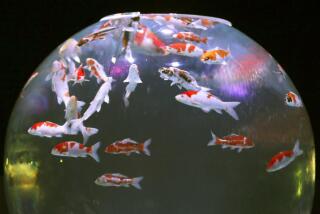Reporter’s Notebook : Imported Bubbly Is Toast of Trade Talks
- Share via
SAN FRANCISCO — On his way to Hawaii after a three-day visit to Washington, Japanese Prime Minister Yasuhiro Nakasone distributed Champagne to the party of officials and journalists traveling aboard his special flight.
Even U.S. Secret Service agents, who will stay with the party until it leaves Honolulu on Monday, were arm-twisted by stewardesses into imbibing on the job.
“It’s a traditional part of a trip abroad,” they were told.
Leaving the tensions of trade frictions behind, at least for the moment, Nakasone walked through the aisles, clinking glasses in toasts and thanking officials and reporters for “your labors.”
Then, all members of the party, reporters and Secret Service agents included, were invited to the forward cabin to pose in groups of three for a commemorative photograph with the prime minister.
“The Champagne was French. It made no contribution to improving the trade imbalance with the United States,” one reporter chided Nakasone, referring to his commitment to President Reagan to reduce what the two leaders agreed was a “politically unsustainable imbalance.”
“That’s true,” said the prime minister, who had while in Washington urged American industry to improve its international competitiveness. “But the chocolate put by my bedside at my hotel in Washington was Belgian, not American.”
The upbeat mood was a sharp contrast with the flight Wednesday from Tokyo to Washington.
Nakasone, reporters were told, spent his time reading a Japanese book called “The Konoue Era” about the life of Prince Fumimaro Konoue, who was Japan’s last civilian prime minister before Army Gen. Hideki Tojo took over in 1941 on the eve of the Japanese attack on Pearl Harbor.
The prime minister, his spokesman said, was impressed by a description of efforts that were made to arrange a meeting between Konoue and President Franklin D. Roosevelt in an attempt to stave off the developing confrontation between the two countries.
“If that meeting had occurred, perhaps World War II would not have taken place,” Nakasone said.
The episode underscored the mood in which Nakasone approached the American visit.
In a speech Friday at the National Press Club, Nakasone declared that escalation of the trade imbalance between Japan and the United States, which amounted to $58.6 billion in Japan’s favor in 1986, and U.S. condemnations of Japan as “unfair” were “threatening to shake the very foundation of the U.S.-Japan relationship.”
Japanese reporters, in interpretive stories they sent to Tokyo, agreed that Nakasone had at least averted losing what the prime minister himself called a “gamble” in traveling to Washington in the midst of heated congressional condemnation of Japan. The consensus was that Nakasone had not exacerbated ill feeling toward Japan. Neither the Japanese reporters nor officials, however, left Washington convinced that he had eliminated American irritations toward Japan.
A Foreign Ministry official, who asked not to be named, said the White House, fearing irreparable damage to relations with Tokyo, had “gone out of its way” to portray the visit favorably. Senators and congressmen, for their part, were “too polite to vent their anger directly” in their meetings with Nakasone, he added.
When Nakasone paid two visits to Capitol Hill to meet leaders of the Senate and the House, he had prepared himself to be questioned on a long list of individual complaints against Japan.
But the issue raised by Sen. Claiborne Pell (D-R.I.) left the prime minister stumped.
Pell, chairman of the Senate Foreign Relations Committee, said that Japan’s tariffs on imports of squid were too high and asked that they be lowered. Rhode Island fishermen, it appears, want to sell squid they catch to Japan, where squid is a favorite dish.
Nakasone had to confess that he did not know anything about Japan’s squid tariff. The issue had not been raised previously in government-level negotiations.
“Gumma, the prefecture (state) I come from, is landlocked and I don’t know much about maritime products. But I’ll look into the matter,” he promised Pell.
More to Read
Sign up for Essential California
The most important California stories and recommendations in your inbox every morning.
You may occasionally receive promotional content from the Los Angeles Times.









